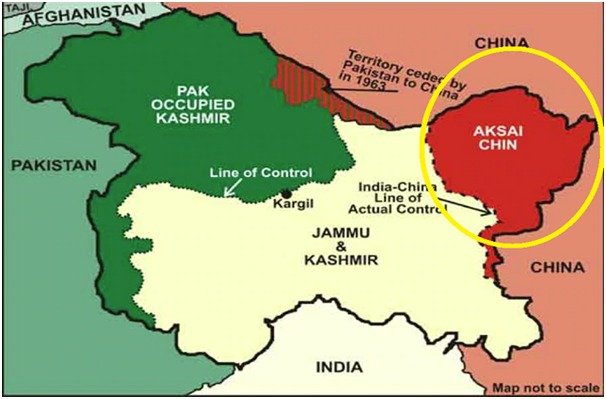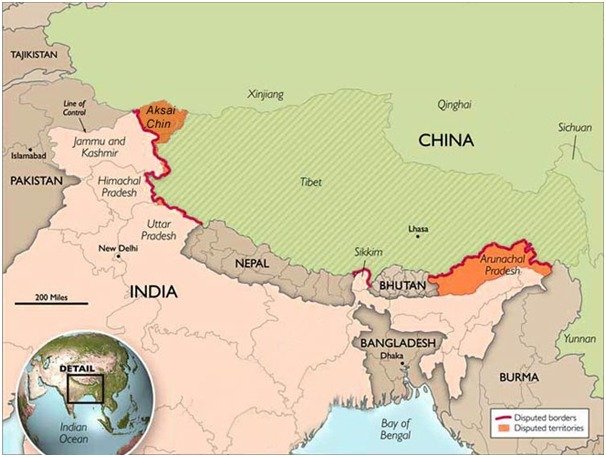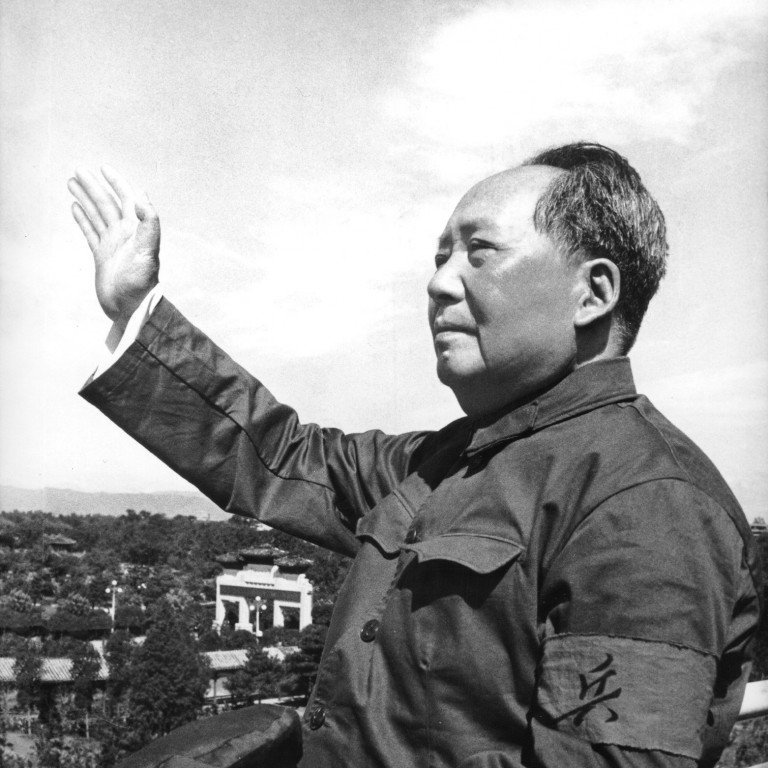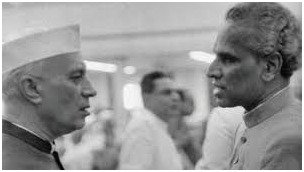By – Alquamah Nasir

Aksai chin, also known as Aksayqin the blood-soaked barren land, these lands may be barren but its political significance is far from barren. It’s a land we hesitate to talk about but this land is one of the reasons for India’s huge defense budget. So let’s unwind the mysteries of these lands and know why it is so significant for both India and China.
On October 20, 1962, the People’s Liberation Army struck simultaneously, all along the India-China frontier — a move smacking of long preparation. The 13 forward Indian posts, from Galwan Valley up to the north of Daulat Beg Oldi were attacked by the Chinese forces. Concurrently, in the eastern sector, they launched an attack on Indian forces deployed along the Namka Chu river and at Khinzemane, eventually enveloping in their attack on four out of the five frontier Divisions of the North-East Frontier Agency (NEFA), namely Kameng, Subansiri, Siang, and Lohit Divisions.
As a matter of fact, India and China have mainly three disputed territories the Southern Tibet [Arunachal] and Tawang in the Eastern Sector and Aksai Chin in the Western Sector. So the question comes…
Why Aksai Chin among the three?

(Source – India today)
Aksai Chin is a high altitude, barren and scarce in resources place, Southern Tibet and Tawang is a low-lying region with a suitable climate and extraordinarily rich in resources; it is one of the most fertile regions in Tibet. Therefore, many people in China hold the viewpoint that in the wake of the Sino-Indian war, it was a huge mistake to keep the deserted Aksai Chin and part away with the Southern Tibet and Tawang. It is in this context that many in China argue that in order to resolve the border issue India must hand over this territory, i.e. China relinquishes the Aksai Chin and get back Southern Tibet and Tawang. However, the Chinese authorities pointed out that these people have failed to understand the impact of these few pieces of territories to the national interests of India as a whole.
At that time, China’s strategy was to defend eastern China from the US and Japan and stabilize western China with Central Asia, and southwest China as the rear front of China. Therefore, it was China’s strategic requirement to stabilize the rear areas. A long-drawn war with India in this region would have thrown Tibet and Sichuan in the forefronts of the battle for a long-long time, thus converting the rear fronts of China into the frontlines. In such a scenario, China’s strategic rear, would have reduced to the Hunan and Hubei, and would have not only resulted into long-term instability but would have also seriously impacted on the economic development of China. Therefore, considering the overall national interests of China, to give up the possessions of southern Tibet and Tawang in the wake of 1962 victory, was a wise move.
So we can conclude that the capture of Aksai chin was a strategically advantageous move for China but the story doesn’t end here. The resolution of the border issue cannot be simply gauged from the angle of conflicts but has to be viewed from the respective strategic heights of the two countries, and the ownership of these territories is related to the long term national interest and power projections and contraction of India and China.

So you may be wondering if these territories were disputed,why did China choose 1962 to attack and not before or after 1962?, so let me help you there and explain what was the advantage of October 1962… I’ll point out the reasons one by one.
1. In the 1950s in order to connect Tibet with Xinjiang China initiated a construction project to lay down a road between them. The Indian discovery of road started the conflict and as a result, China retained control of 14,700 square miles of territory in Aksai Chin.
2. Mao Zedong and Lin Biao viewed the soldiers of the communist party as the most suitable candidate for the 2nd and 3rd generation. Army uniformity and discipline were seen as it could transcend the classes and all the army men can be made to comply with the rigorous political ideologies. And to make these army heroes who will further propagate their political ideologies, a war is inevitable and thus China got one more reason for war as it wanted to make its political ideology strong.
3. Soviet and India were close friends and this factor has always deterred China from waging a war, but at that time soviet was busy with the Cuban missile crisis and China saw this as a ripe time to wage war.
4. India gave asylum to the Dalai Lama Tibet’s spiritual leader and this too infuriated China.
5. Nehru had explained in an interview aired just nine days before his death in 1964 that the Chinese acted the way they did principally as “they wanted the Asian world to realize that they are the top dog in Asia and that any person or any country in Asia should remember that”. Months earlier, Nehru had written to U.S. President John F. Kennedy that China was making a bid for leadership, not just of Asia, but “as a first step in their bid for world leadership”. So far as India was concerned, continued Nehru, China’s aim was not to acquire territory: the real aim was “to force on India a political settlement which will involve India re-orienting its policies to suit the pattern of Chinese global policies”.
6. Pakistan has always been a strong ally to China and maintaining close geography was the priority of both the nation and with the capture of Aksai Chin China would be closer to its ally and could easily aid Pakistan militarily and economically.
And thus, due to these factors, China waged war and during the course of war Kennedy resolved the Cuban missile crisis and Soviets compelled China to stop the war and on the other hand Kennedy reverted to the call for help from Nehru and on October 12, 1962, Nehru asked Chinese to free Indian territories of Chinese soldiers and after winning the war China withdrew and formed a demilitarized zone on either side of L.A.C.
You might be wondering that who were the people behind such a defeat the people who ignored the messages at the right time to act upon it?

Vengalil Krishnan Krishna Menon
(3 May 1896 – 6 October 1974) the then Defence Minister was an Indian politician, non-career diplomat and a nationalist who has been described by some as the second most powerful man in India, after his ally, the 1st Prime Minister of India Jawaharlal Nehru, Menon took to denying that there was any problem with China, or that China was in occupation of what the government of India considered Indian territory. Addressing officers of the Indian Air Force Station, Agra, he had declared: “I am not aware of any aggression, incursion, encroachment or intrusion by the Chinese of any part of Indian territory.”
The then Chief of the Army Staff, General P.N. Thapar, had told Krishna Menon that the Indian Army did not have the necessary strength to evict the Chinese from their posts. With the troop deployment of six Chinese soldiers to one Indian, the Indian Army could have been facing an adventure. Krishna Menon reassured him that the Chinese Deputy Premier, Chen Yi, had told him that China would never fight India over the border issue. General Thapar had wanted to share his misgivings with Prime Minister Nehru, but was dissuaded by the Cabinet Secretary on the ground that Nehru might consider that General Thapar was “afraid to fight”. Later, when a prominent Indian journalist checked from Krishna Menon whether General Thapar had brought up his concerns, Krishna Menon had replied with an acid tongue: “That toothless old woman; he did not know how to fight a war.”
A contemporary observer, Raj Thapar, founder-editor of the journal, Seminar, described in his autobiography how Mr. Menon, “firmly opposed moving a single man from the Kashmir front, so convinced was he that Pakistan would attack at any opportune moment”. He wrote that it was his immutable belief that Pakistan was the threat, not China. Krishna Menon could go to any lengths to convince others of this point of view. He asked India’s High Commissioner to Pakistan, Rajeshwar Dayal, to brief a group of senior Indian Army officers about Pakistan’s war preparations against India. Warned that projecting a danger from Pakistan was part of the Defence Minister’s larger plan, in the meeting Ambassador Dayal said that he had detected nothing about the Pakistani preparations. According to witnesses, Krishna Menon was visibly annoyed.
Jawaharlal Nehru
Nehru’s ignorance was also a major reason for this drastic defeat in the Sino-Indian war…
Nehru too shared the view that Pakistan posed a greater threat to India. He and Krishna Menon reinforced each other’s slant in this respect. “To be frank about it,” Nehru had acknowledged in parliament soon after the 1962 war, India’s defense dispositions “were based on our unfortunate position vis-à-vis Pakistan.” He was misled also by the good equation he had developed with Premier Zhou En-lai, forgetting that countries seldom predicate their security interests on the personal predilections of their leaders.
Did this question strike in your mind why India is on the defensive side for decades and didn’t tried to reclaim the territory and why our defense budget is very huge?
To make it clear, the current status quo at the Sino-Indian border is extremely beneficial for China. Aksai Chin is a high terrain and gives a tactical advantage to China in terms of war, and also Aksai Chin is in very close proximity to Delhi and major key cities of India it is this factor that made India deliver such high deployment in these areas. The boundary problem has contained India for decades, India has invested huge resources on it, and has enabled China to develop peacefully for decades.
Dr. B R Deepak, an Associate Professor in the Centre of Chinese and Southeast Asian Studies, Jawaharlal Nehru University who once wrote as a Military Observer in 2010 and I quote “As long as the status quo is maintained, over the next few decades India would be forced to remain defensive, would be forced to further waste huge manpower and national resources. At the same time, Pakistan is also containing India, therefore, it would be impossible for India to catch up with China in decades to come. China enjoys an enormous strategic advantage over India vis-à-vis the current status quo; China can easily subdue India, and India would not be in a position to pose real threat to China in the coming decades “.
Although circumstances are different today, India continues to face the two-front conundrum. The last word on the present crisis is yet to be said. India must meanwhile assess its options in a balanced way. While remaining clear-eyed about Chinese intentions, These need a long-term vision, executed with patience and perseverance.
Source:
https://www.c3sindia.org/archives/why-china-retained-aksai-chin-and-gave-up-southern-tibet/ (Dr. B R Deepak’s full article)
https://www.thehindu.com/opinion/lead/indias-continuing-two-front-conundrum/article31884155.ece

It’s really great and knowledge giving. Thanks brother
LikeLike